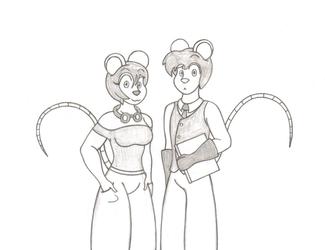Sign In
CloseThe Benkari Empire
Population:
approx. 55,700,000 citizens
100% big cat (lion, tiger, cheetah, lynx, leopard, cougar, etc.)
Territory:
approx. area - 1,500,000 square miles
mostly grasslands, hills and mountains with a few forests and jungles speckling the terrain
Society and Culture:
The Benkarians are a proud warrior people and virtues like strength, honor, courage and discipline are quite important to them. Benkari males are the ones who usually become warriors and soldiers; however, it's not uncommon for women to become warriors as well. In regards to fashion, both sexes have been known to wear fairly basic clothing. Men normally wear loose pants along with some kind of shirt or abdominal wrapping, while women will usually wear some kind of bikini top or shirt with either long or short pants. Benkari women have also been known to wear dresses, but such garments are usually meant for special occasions, like festivals or weddings. Due to their warrior heritage, many Benkarians will carry weapons (concealed or otherwise) on their persons at all times. Many Benkarians also have well-toned or muscular physiques since the most respected Benkarians are also usually the most physically powerful. Like the Landonians, Benkarians have been known to have rather large families. However, unlike Landonian women who tend to carry either one or two children at a time, Benkari women usually have three, four, five, or sometimes even six children in one pregnancy. Some Benkari women have also been known to have multiple sets of children (or "litters" as they're commonly called).
While most Benkarians have some form of occupation like merchant, farmer, scholar, craftsmen, etc., such employment is second to that of their true profession; that of a warrior. All Benkari men (and some women) receive some form of martial arts or combat training, depending on what clan they're from. Grappling, swordsmanship, axe-fighting, and archery are just a few examples of what a Benkarian can be trained in. Furthermore, Benkarians are strictly against using firearms; they regard such weapons as "crutches for the weak and unskilled". Especially since guns are much easier to learn and master as compared to swords or other martial arts.
Government:
The various towns, cities and territories of the Benkari Empire are each controlled by a unified group called a clan. These clans are in turn lead by martial arts/weapons masters called shinrai (shin-rye). A shinrai is a highly skilled warrior that has reached an incredible level of strength, speed, and prowess through many years of training and conflict. Most shinrai are masters in only one specific type of fighting style, like swordsmanship or wrestling; however, some shinrai have been able to master multiple fighting styles.
In order to become a shinrai, a warrior must do one of the following; either A) train under a shinrai and take over their position after years of physical, mental, and spiritual training or B) defeat a shinrai in honorable combat. So far, no one has ever defeated a shinrai through honorable means.
The empire itself is ruled by their most powerful, honorable, and virtuous warrior; the Deshra (aka the God Emperor). Despite what his name may imply, the God Emperor is not actually considered a god. Instead, he's believed to be a mere mortal that's selected by the gods in order to lead the empire. When the Deshra dies or can no longer lead, twelve priests of the Temple of Rokuda perform the most sacred ritual known to their religion. Through this ritual, these priests locate the Consho (or Chosen One), the person who will become the new Deshra. The priests then travel to the Consho's location and bring him to the Imperial Capital, where he will be officially declared Deshra.
The current ruler of the Benkari Empire is Deshra Koryu, a middle-aged man that came from a small farming village in the far western part of the empire. Like many Deshras before him, he has served his people well as both an honorable and virtuous ruler.
Religion:
The vast majority of Benkarians worship a pantheon of gods called the Bakadoshi (aka the Magnificent Ones) and most of these gods represent various aspects of Benkari society. Some examples include Raiga, god of discipline and respect as well as Shuta, goddess of dancing and music and Haname, goddess of love and fertility. However, the most revered deities within the Bakadoshi pantheon are Rokuda, king of the gods and Banrai, god of strength, courage, and war. Rokuda is usually portrayed as an old but powerful lion with loose warrior robes and a finely-crafted sword. As for Banrai, he tends to be portrayed as a very large and muscular tiger with simple pants and foot wrappings, along with a large war club straddled on his back. While Banrai's dogma teaches how one should acquire great strength through training as well as face adversity head-on, Rokuda's dogma teaches how one should seek strength within himself and that true courage is not the absence of fear but instead the presence of fear along with the willingness to continue.
Brief History:
Long ago in the year 813 AD, war broke out between all the clans of Benkari Island. As to how or why the war started, no one knows; for the reasons behind such a conflict have long been forgotten. In any case, when the war began, hundreds of clans attacked one another with great and terrible ferocity. Ultimately, this conflict would last for over 400 years and would later be known as the War of Oblivion; since when the conflict finally ended in 1216 AD, most of the clans were left on the brink of extinction and many others were completely wiped out. For the next 100 years, the broken clans would struggle to survive.
In 1318 AD, A young warrior by the name of Tohru Ishida would band the clans together by claiming that the Bakadoshi chose him to rebuild their once great lands. At first, very few Benkarians believed him, but as the years passed, his influence grew. Such was especially the case when he started making predictions of the future that became eerily true. By 1347, all of the clans were unified under one banner and Tohru Ishida became the first Deshra of the new Benkari Empire (where his name would be changed to Deshra Ishida). The Benkari clans would grow, prosper, and rebuild under his reign. Before his death in 1386, Deshra Ishida taught the Temple of Rokuda priests the Consho (Chosen One) Ritual so that they could find a worthy successor. The Benkari Deshras that came after Ishida would rule the empire with both honor and compassion and they would continue to lead their people to prosperity. By 1620 AD, the Landonians would try to conquer the Benkari Empire but through their courage and tenacity, the Benkarians successfully pushed their invaders back and in 1625 AD, the Benkarians would sign an armistice with the Landonians. The armistice currently lasts to this day (1786 AD).
Submission Information
- Views:
- 369
- Comments:
- 0
- Favorites:
- 1
- Rating:
- General
- Category:
- Visual / Sketch




